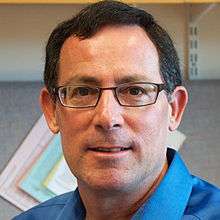Shlomo Zilberstein
| Shlomo Zilberstein | |
|---|---|
 | |
| Born |
1960 Israel |
| Residence | United States |
| Fields | |
| Institutions | University of Massachusetts, Amherst |
| Alma mater | |
| Thesis | Operational Rationality Through Compilation of Anytime Algorithms (1993) |
| Doctoral advisor | Stuart J. Russell |
| Known for |
Anytime Algorithms Decentralized Partially Observable Markov Decision Processes |
|
Website www | |
Shlomo Zilberstein (Hebrew: שלמה זילברשטיין; born 1960) is an Israeli-American computer scientist. He is a Professor of Computer Science and Associate Dean for Research and Engagement in the College of Information and Computer Sciences at the University of Massachusetts, Amherst.[1] He graduated with a B.A. in Computer Science summa cum laude from Technion – Israel Institute of Technology in 1982, and a Ph.D. in Computer Science from University of California at Berkeley in 1993, advised by Stuart J. Russell.[2][3] He is known for his contributions to artificial intelligence, anytime algorithms, multi-agent systems, and automated planning and scheduling algorithms, notably within the context of Markov decision processes (MDPs), Partially Observable MDPs (POMDPs), and Decentralized POMDPs (Dec-POMDPs).
Research
His research is in the area of artificial intelligence, specifically automated planning, in addition to decision theory, reasoning under uncertainty, heuristic search, automated coordination and communication, and reinforcement learning.[4]
He directs the Resource-Bounded Reasoning Laboratory[5] at the University of Massachusetts, Amherst.[6] In 2002, Daniel S. Bernstein, Robert Givan, Neil Immerman, and Shlomo Zilberstein introduced the Decentralized POMDP which extends the widely used single-agent POMDP model to a multi-agent scenario (Dec-POMDP).[7] He has also developed AI algorithms for semi-autonomous systems with potential applications to semi-autonomous cars.[8][9][10][11]
Service and awards
He served as editor-and-chief of the Journal of Artificial Intelligence Research and associate editor of the Journal of Autonomous Agents and Multi-Agent Systems.[12] Additionally, he served as chair of the conference committee for both the Twenty-Ninth and Thirtieth AAAI Conference on Artificial Intelligence.[13][14] The National Science Foundation awarded Dr. Zilberstein with the RIA, CAREER, and ITR awards.[15] In 2011, he was elected as a fellow of the Association for the Advancement of Artificial Intelligence.[16]
Selected publications
- Bernstein, Daniel S.; Givan, Robert; Immerman, Niel; and Zilberstein, Shlomo (2002). "The Complexity of Decentralized Control of Markov Decision Processes" (PDF). Mathematics of Operations Research. 27 (4): 819–840. doi:10.1287/moor.27.4.819.297.
- Hansen, Eric A.; Zilberstein, Shlomo (2001). "LAO*: A Heuristic Search Algorithm that Finds Solutions with Loops" (PDF). Artificial Intelligence. 129 (1-2): 35–62. doi:10.1016/s0004-3702(01)00106-0.
- Zilberstein, Shlomo (1996). "Using Anytime Algorithms in Intelligent Systems" (PDF). AI Magazine. 17 (3): 73–83.
References
- ↑ UMass Amherst CS faculty list
- ↑ Dr. Zilberstein's Ph.D. thesis
- ↑ His doctoral advisor and thesis as part of his academic genealogy
- ↑ Professional website description
- ↑ Resource-Bounded Reasoning Laboratory website
- ↑ UMass Amherst research groups
- ↑ Dr. Zilberstein's NSF Grant in 2002 in which the Dec-POMDP model was developed
- ↑ Dr. Zilberstein's NSF Grant in 2014 for Semi-Autonomous Systems (SAS) with direct applications to semi-autonomous driving
- ↑ Popular Mechanics news article on semi-autonomous systems
- ↑ NSF news article on semi-autonomous systems
- ↑ Phys.org news article on semi-autonomous systems
- ↑ JAIR editors and staff list from 2012
- ↑ AAAI 2015 conference committee
- ↑ AAAI 2016 conference committee
- ↑ List of NSF CAREER award recipients
- ↑ AAAI fellows list
External links
- Dr. Zilberstein's Academic Website
- Resource-Bounded Reasoning Laboratory website
- Decentralized Partially Observable Markov Decision Process (Dec-POMDP) overview, description, and publications within the field